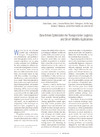Identificador persistente para citar o vincular este elemento:
https://accedacris.ulpgc.es/jspui/handle/10553/75563
| Título: | Data-driven optimization for transportation logistics and smart mobility applications | Autores/as: | Osaba, Eneko Sánchez Medina, Javier J. Vlahogianni, Eleni I. Yang, Xin She Masegosa, Antonio D. Perez Rastelli, Joshué Del Ser, Javier |
Clasificación UNESCO: | 332703 Sistemas de transito urbano | Fecha de publicación: | 2020 | Publicación seriada: | IEEE Intelligent Transportation Systems Magazine | Resumen: | The articles in this special section focus on data driven optimization for transportation and smart mobility applications. We live in an era of major societal and technological changes. Transportation de-carbonization and postindustrial demographic trends, such as massive migrations and an aging society, generate new challenges for cities, making the efficient and sustainable management of services and resources more necessary than ever. Cities must evolve, transform, and become smart to cope with these realities. According to the literature, a city can be referred to as smart when investments in human and social capital and traditional (transportation) and modern [information and communications technology (ICT)] communication infrastructure fuel sustainable economic growth and high quality of life, with a wise management of natural resources, through participatory government. | URI: | https://accedacris.ulpgc.es/handle/10553/75563 | ISSN: | 1939-1390 | DOI: | 10.1109/MITS.2020.3017033 | Fuente: | IEEE Intelligent Transportation Systems Magazine [ISSN 1939-1390], v. 12 (4), p. 6-9, (Diciembre 2020) |
| Colección: | Comentario |
Citas SCOPUSTM
11
actualizado el 08-jun-2025
Citas de WEB OF SCIENCETM
Citations
6
actualizado el 01-feb-2026
Visitas 10
69
actualizado el 10-ene-2026
Descargas
101
actualizado el 10-ene-2026
Google ScholarTM
Verifica
Altmetric
Comparte
Exporta metadatos
Los elementos en ULPGC accedaCRIS están protegidos por derechos de autor con todos los derechos reservados, a menos que se indique lo contrario.
